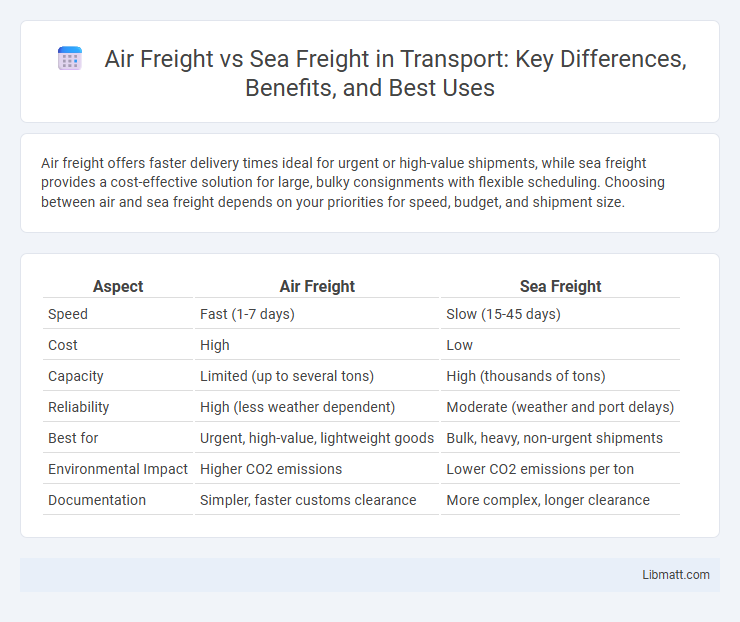Air freight offers faster delivery times ideal for urgent or high-value shipments, while sea freight provides a cost-effective solution for large, bulky consignments with flexible scheduling. Choosing between air and sea freight depends on your priorities for speed, budget, and shipment size.
Table of Comparison
| Aspect | Air Freight | Sea Freight |
|---|---|---|
| Speed | Fast (1-7 days) | Slow (15-45 days) |
| Cost | High | Low |
| Capacity | Limited (up to several tons) | High (thousands of tons) |
| Reliability | High (less weather dependent) | Moderate (weather and port delays) |
| Best for | Urgent, high-value, lightweight goods | Bulk, heavy, non-urgent shipments |
| Environmental Impact | Higher CO2 emissions | Lower CO2 emissions per ton |
| Documentation | Simpler, faster customs clearance | More complex, longer clearance |
Understanding Air Freight and Sea Freight
Air freight offers faster shipping times and is ideal for urgent or high-value goods, leveraging extensive global airline networks to ensure timely delivery. Sea freight provides a cost-effective solution for bulky or heavy shipments, utilizing large cargo vessels that transport goods through major international ports. You should consider factors such as speed, cost, cargo type, and destination when choosing between air freight and sea freight for your shipping needs.
Key Differences Between Air and Sea Freight
Air freight offers significantly faster delivery times compared to sea freight, making it ideal for urgent or high-value shipments. Sea freight is generally more cost-effective for bulk and heavy cargo, with larger capacity and flexibility for oversized items. Your choice depends on balancing speed, cost, shipment size, and destination accessibility.
Transit Time: Speed of Delivery
Air freight offers significantly faster transit times compared to sea freight, with typical delivery ranging from 1 to 7 days depending on the route and service. Sea freight transit times can vary widely, often taking between 20 and 45 days due to slower vessel speeds and port handling processes. Your choice depends on the urgency of your shipment and balancing cost against the speed of delivery.
Cost Comparison: Air Freight vs Sea Freight
Air freight typically costs significantly more than sea freight due to faster delivery times and higher fuel consumption, often making it suitable for urgent or high-value shipments. Sea freight offers a much lower cost per kilogram, ideal for large or bulk shipments where timing is less critical. Your choice should balance budget constraints with delivery speed to optimize logistics expenses effectively.
Cargo Capacity and Limitations
Air freight offers faster delivery but comes with strict cargo capacity and weight limitations, typically accommodating smaller, high-value shipments. Sea freight allows for significantly larger cargo volumes and heavier goods, making it ideal for bulk transportation with fewer restrictions on size and weight. Your choice depends on balancing speed against cargo capacity to meet your shipment requirements.
Environmental Impact and Sustainability
Air freight generates significantly higher carbon emissions per ton-kilometer compared to sea freight, contributing to greater environmental impact, especially in terms of greenhouse gas emissions and fuel consumption. Sea freight, while slower, is more energy-efficient and produces lower emissions, making it a more sustainable option for transporting large volumes over long distances. Choosing sea freight over air freight supports global efforts to reduce carbon footprints and promote greener supply chain practices.
Suitable Goods for Air vs Sea Shipping
Air freight is ideal for high-value, time-sensitive goods such as electronics, pharmaceuticals, and perishable items due to its fast delivery times. Sea freight suits bulk shipments like raw materials, heavy machinery, and non-perishable products where cost-efficiency outweighs speed. Selecting the appropriate shipping method depends on balancing factors like product type, urgency, and transportation cost.
Customs Clearance and Documentation
Air freight offers faster customs clearance due to standardized procedures and electronic documentation, reducing delays at ports. Sea freight requires more extensive paperwork, including bills of lading and customs declarations, which can prolong clearance times, especially for large shipments. Your choice between air and sea freight impacts the complexity and speed of customs processes, influencing overall delivery schedules.
Risk Management and Security
Air freight offers enhanced risk management and security due to stringent airport regulations, advanced tracking systems, and shorter transit times that reduce exposure to theft or damage. Sea freight involves higher risk levels linked to longer transit durations, potential piracy in certain maritime routes, and vulnerability to weather disruptions, though insurance and container sealing practices help mitigate these threats. Your choice between air and sea freight should balance the critical need for security with acceptable exposure to transit risks based on cargo value and delivery urgency.
Choosing the Right Freight Method for Your Business
Selecting between air freight and sea freight depends on your business priorities such as speed, cost, and cargo type. Air freight offers faster delivery times ideal for urgent or high-value shipments, while sea freight provides a cost-effective solution for bulky or heavy goods with flexible scheduling. Understanding your shipment's size, budget, and timeline ensures you choose the freight method that best supports your supply chain efficiency.
air freight vs sea freight Infographic

 libmatt.com
libmatt.com